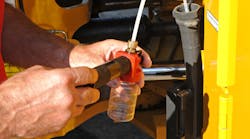Are you sure your current hydraulic fluid is doing enough for your equipment? It may be time to reexamine its performance. Many fleet owners mistakenly believe that all hydraulic fluids are created equal, but a poor quality fluid can result in some of your most valuable equipment being protected by just a layer of thick, oxidized oil. This can lead to damaged or nonfunctioning machinery, making it difficult to complete timely operations. The difference between premium hydraulic fluid and standard or generic fluid could not be more stark.
Why choosing quality over price per gallon saves
When choosing a hydraulic oil, it’s easy to be swayed by the price per gallon. However, there are hidden costs to choosing a product based on the upfront price.
High-quality hydraulic fluid is formulated with purer base oils and additives that better withstand the heat fluctuations in hydraulic equipment. This means that higher-quality fluids often can last well over 5,000 hours. What are the average working hours of a lower-quality hydraulic fluid, you ask? Around 2,000 hours or less. The Cenex® line of hydraulic fluids includes INDOL ® EH ISO 46 AND INDOL® NZ ISO 46MV, and the entire Cenex Indol line of products average more than 6,000 working hours. The price for premium fluid is more than made up in service longevity, especially in equipment that runs continuously.
High-quality hydraulic lubricants save time as well. Changing hydraulic fluid can be a time-consuming process, depending on the equipment. Longer change intervals mean less time wrestling with equipment and more time focusing on other important jobs on your operation.
How to identify what your equipment needs
If you’re not sure whether the hydraulic fluid you’re using is considered premium or not, there is an easy way to tell. On the fluid’s datasheet, look for the oxidation test called ASTM-D943. A premium product will indicate a 5,000-plus hour change interval, while a generic will be closer to half of that. Your owner’s manual also provides guidance for the types of hydraulic fluids your equipment needs and which oil is acceptable.
Fluid cleanliness is also a key consideration for choosing a hydraulic fluid. THIS CHART from Machinery Lubrication shows the industry standards for the International Organization for Standardization (ISO) cleanliness codes, which will help explain the numbers associated with your particular fluid. Rule of thumb, the smaller the numbers the cleaner the fluid.
Testing has proven that cleaner hydraulic fluids protect the sensitive parts and valves of most hydraulic pumps. We recommend running an oil analysis test to assess how your current lubricant is capable of performing.
As you examine your current hydraulic lubricant to see if it’s meeting your equipment’s needs, use the CENEX EQUIPMENT LOOK UP TOOL to find additional information and product recommendations specially for your equipment.



